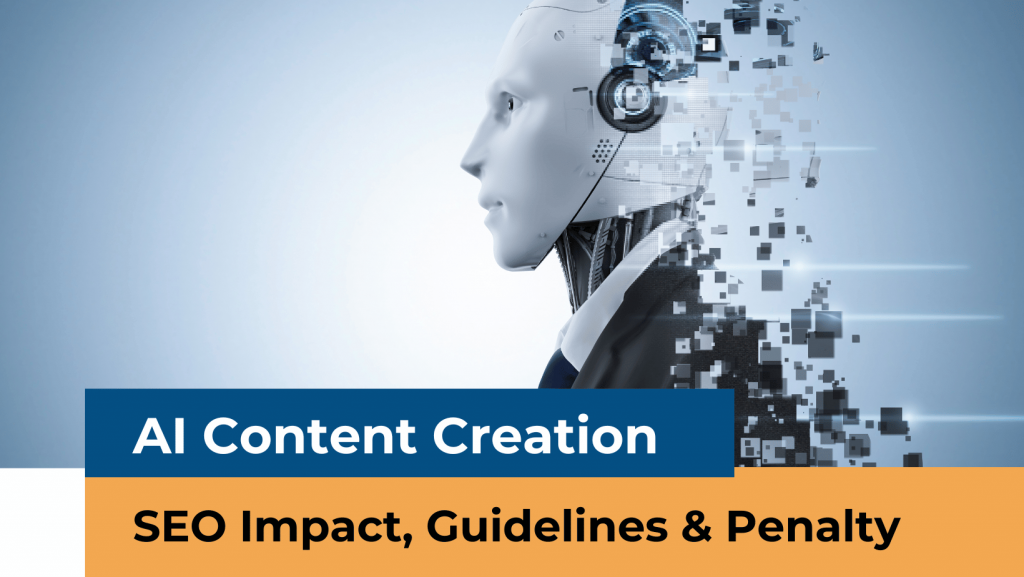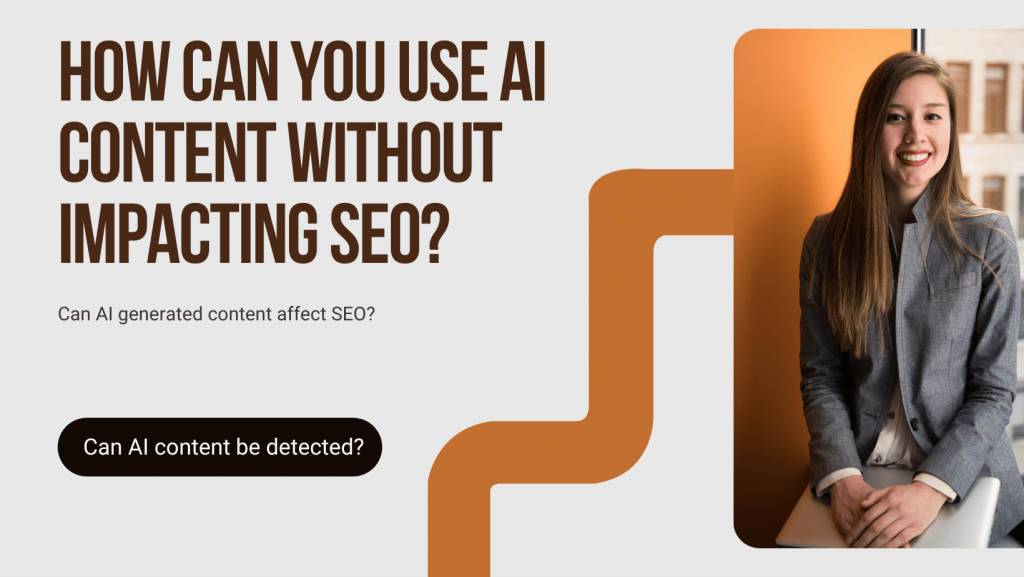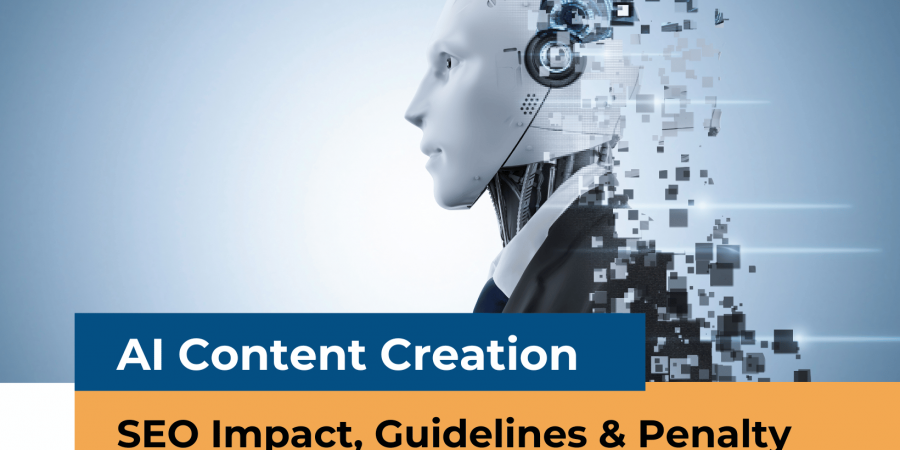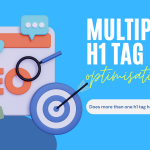AI Content Creation – SEO Impact, Issues, Guidelines & Penalty
What Is AI Powered Content Creation and Strategy?
AI-powered content creation and strategy refers to machines generating written, audio and video content based on either user inputs or pre-determined parameters. Natural language processing (NLP) and natural language generation (NLG) models are used to generate the different types of content.
AI tools like GPT-3 also help understand how topics are covered online, how best to cover those topics, develop strategies that can outmanoeuvre competitors and attract target audiences, create comprehensive content plans and deliver better results for brands.
The use of AI for content creation has revolutionized the industry since its introduction. AI applications can almost instantaneously comprehend volumes of data that humans would take years to process. The ability to do so has helped many organizations develop strategies that can be used quickly to great effect compared to manual efforts. Additionally, AI-powered content strategies have a comprehensive approach that helps them deliver insights that normally require months or even years’ worth of manual effort.
No AI-Generated Content, AI-Generated Content Is Against Guidelines: Says Google

Despite the rise in AI-generated content, Google made it clear that such material will not be accepted if its of low quality or auto-generated. Search engine journal’s article “Google Says AI Generated Content Is Against Guidelines” caused many debates among digital marketers and SEOs when published in April 2022.
In the article, John Mueller, Google’s Webmaster Trends Analyst, said that content generated by Artificial Intelligence (AI) falls under the category “auto-generated content” and is considered spam when manually reviewed by systems.
To make matters clear, Mueller posted on Twitter:
Auto-generated/spun content for GMB or websites remains against our guidelines – regardless of where it comes from.
Twitter
From this statement, one can most certainly hash out two important things:
First, Google does not encourage or approve low-quality or auto-generated content; secondly, such content cannot be an exception because of being produced by AI algorithms.
More from John Mu, on AI Content creation tools:
Can Google Detect AI Content Generation?
Google’s Webmaster Trends Analyst John Mueller recently said AI-generated content is considered spam according to the search engine’s webmaster guidelines.
“In general, our algorithms are not built in a way where they can detect texts written by AI,” Mueller added.
The practical uses for such tools have not been proven yet, and any website should use caution when considering them. Poor implementation may result in significant ranking penalties due to Google’s inability to detect AI-written texts without assistance from human reviewers. Despite this, however, some organizations have used these tools without issue.
Businesses and marketers have been turning to AI-generated content as a solution to create quality content faster. However, many are concerned that employing an automated approach will lead to search engine penalties from Google if the output isn’t up to standards.
The good news is that Google penalizes low-quality content regardless of whether it was written by a human or generated with AI. This means businesses should optimize their AI-generated content just like any human-written and published content, following all relevant SEO rules.
Over the years, Google has made several updates intended to crack down on spammy content, but these do not indiscriminately apply across all AI-generated material. Businesses can ultimately benefit from using it across their SEO strategies if they stress quality control when producing this type of content.
Will Google penalize my AI-generated content?
Google is not clear on how it would penalize AI-generated content. It depends on which kind of AI writing tool you use and how you use the content it produces. That said, Google may still penalize AI-generated texts for preventing illegitimate techniques and keeping its search engine results accurate.
Can AI-generated content affect SEO?
Artificial intelligence (AI) generated content can affect search engine optimization (SEO) in many ways.
On the positive side, AI can be used to generate high-quality, relevant content that is useful to readers and helps improve a website’s overall user experience. This content is likely well-received by search engines and may help improve the website’s rankings.
However, if AI is used to generate low-quality or spammy content, it may hurt SEO. Search engines generally do not tolerate spam and may penalize websites that use AI to generate large amounts of low-quality content to manipulate search rankings.
Businesses need to use AI responsibly and comply with search engine guidelines to avoid negative impacts on SEO. This includes ensuring that any AI-generated content is high quality, relevant to the website’s audience, and complies with copyright laws and other intellectual property regulations.
Will Google Penalize AI Content?
Google may penalize websites that use artificial intelligence (AI) to generate low-quality or spammy content. The use of AI to generate large amounts of content to manipulate search rankings is considered spam and is generally not tolerated by search engines.
That being said, not all AI-generated content is considered spam. Many websites use AI to generate high-quality, relevant content that is useful to readers. Search engines will not likely penalize AI-generated content in these cases.
Businesses need to use AI responsibly and in compliance with search engine guidelines. This includes ensuring that any AI-generated content is high quality, relevant to the website’s audience, and complies with copyright laws and other intellectual property regulations.
Can AI content be detected?
It is generally possible for artificial intelligence (AI) generated content to be detected, although the specific methods used to do so may vary.
One way that AI content can be detected is through natural language processing (NLP) algorithms, which are designed to analyze and understand the meaning of written or spoken language. By analyzing the language used in a piece of content, NLP algorithms can often identify patterns or characteristics indicative of AI-generated content.
Another way that AI content can be detected is through machine learning algorithms, which can be trained to recognize patterns or features commonly found in AI-generated content. These algorithms can then be used to identify AI-generated content with high accuracy.
The methods used to detect AI-generated content are constantly evolving, and it is likely that more advanced techniques will be developed in the future.
How can you use AI content without impacting SEO or Google penalties in the long run?

Below is a checklist of things you can follow to use AI-generated content while avoiding SEO and Google penalties:
- Use AI to generate high-quality, relevant content: It is important to ensure that any AI-generated content is high quality and relevant to the website’s target audience. This will improve the user experience and increase the chances that search engines will receive the content well.
- Comply with copyright laws and other intellectual property regulations: It is important to ensure that any AI-generated content complies with copyright laws and other intellectual property regulations. This includes obtaining permission to use any third-party content and properly citing any used sources.
- Avoid using AI to generate large amounts of low-quality or spammy content: Search engines generally do not tolerate spam and may penalize websites that use AI to generate large amounts of low-quality or spammy content for the purpose of manipulating search rankings.
- Use AI responsibly: It is important to use AI responsibly and comply with search engine guidelines to avoid negative impacts on SEO. This includes ensuring that any AI-generated content is high quality, relevant to the website’s audience, and complies with copyright laws and other intellectual property regulations.
- Regularly review and update AI-generated content: It is important to review and update AI-generated content regularly to ensure that it remains accurate and relevant. This will help maintain the content’s quality and value and prevent it from becoming stale or outdated.
Digital Marketing Consultant and blogger with over a decade of experience in crafting compelling digital strategies. From SEO wizardry to social media magic, I’ve been navigating the digital landscape like a pro. With a knack for engaging content and a passion for innovative marketing solutions, my journey has been all about transforming online presence into powerful brand stories.





